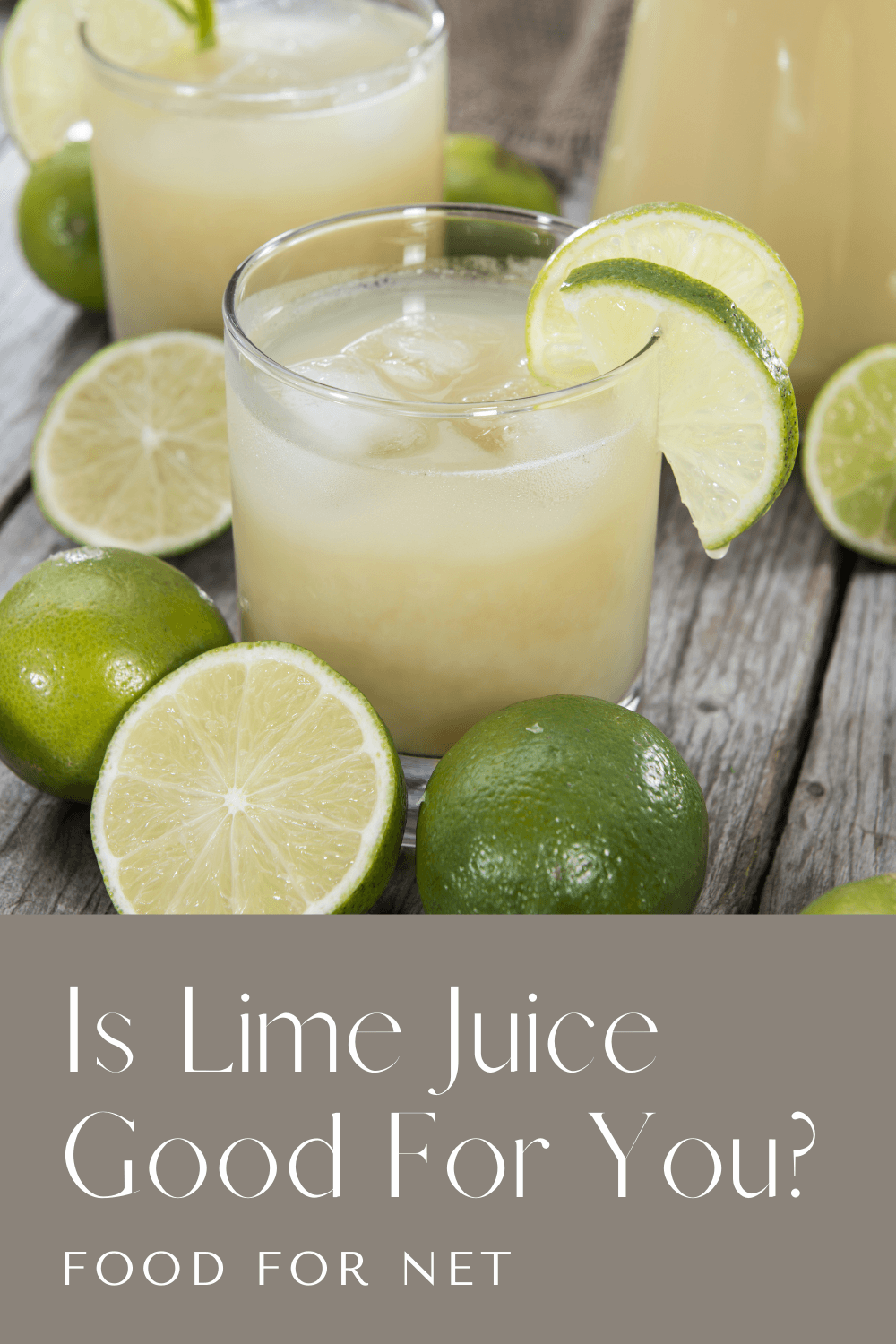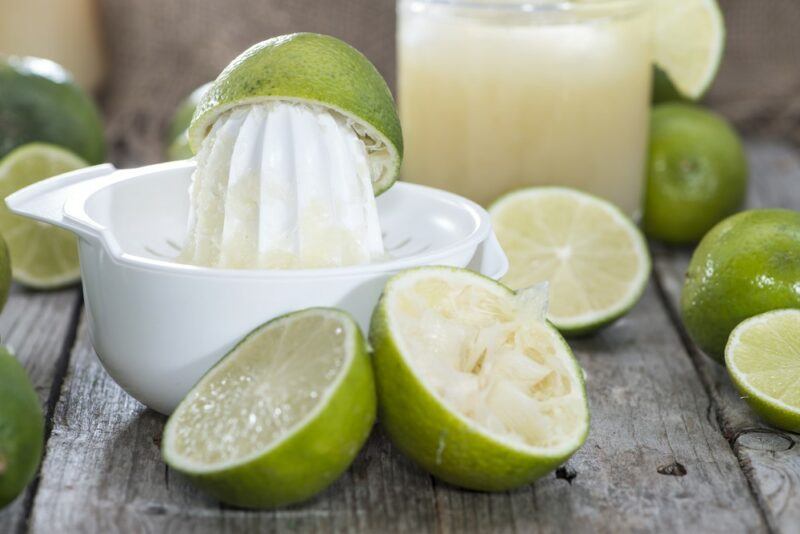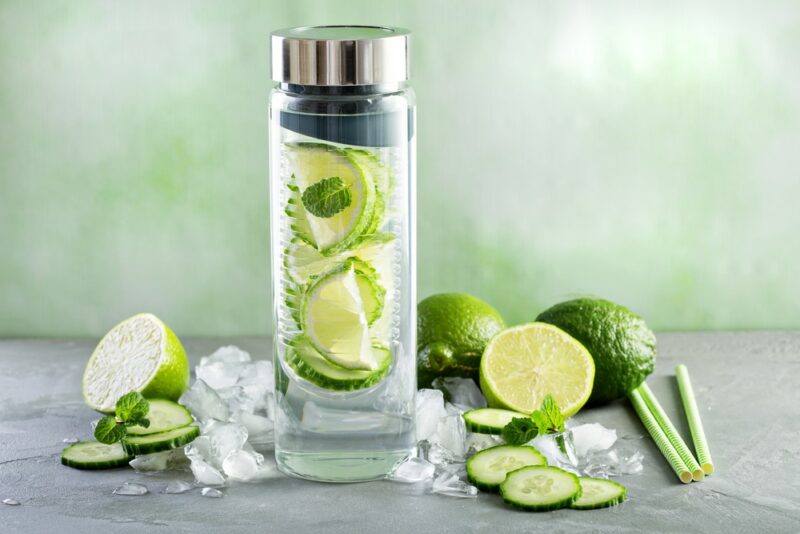
Like lemons, limes offer a tart flavor that is fantastic for augmenting meals and drinks. But, while lemon juice has become famous as a detox ingredient, lime juice hasn’t seen the same fame. Is lime juice good for you then? It has many of the same properties as lemon juice, so it’s easy to see how it could be.
Still, it’s important to take nothing for granted in the world of nutrition. We know that foods often have unexpected effects on health, like how high oxalate foods can increase the risk of kidney stones. Many foods also have an interesting combination of positive and negative effects. So, let’s see what the story is for lime juice.
Is Lime Juice Good For You?
- Benefits Of Lime Juice
- Are There Any Problems With Lime Juice?
- Is Lime Juice Alkalizing?
- What About Lime Water?
- Fresh Juice Versus Bottled Lime Juice
- Final Thoughts
Benefits Of Lime Juice

The Antioxidant Content
Antioxidants can be found in all fruits and vegetables. These plant-based compounds are renowned, as they help to reduce the risk of oxidative damage caused by free radicals.
This effect may then help to decrease your risk of a variety of diseases, such as heart disease and cancer.
Antioxidants appear to be most powerful when you’re consuming them in whole foods, like fruits, vegetables, and legumes. Antioxidant supplements don’t offer the same benefits at all and may even cause harm.
Lime juice is a great choice for antioxidants, as it’s easy to add into your diet. You can simply squeeze a lime over any salad or even a hearty meal.
May Help With Your Immune System
Lime juice is an excellent source of vitamin C. Like other nutrients, vitamin C plays various roles in our bodies. It even acts as an antioxidant. It’s most famous, however, for its role in our immune systems.
Some theories even suggest that high vitamin C doses can help to reduce the length and severity of colds. Research shows mixed outcomes, but there’s enough potential here to give vitamin C a try for yourself.
While you can find plenty of vitamin C rich foods to choose from, lemon and lime juice are both helpful because they’re so easy to use. Even their acidity can be helpful, as the juice can your throat to feel better.
Why not try adding some lime juice to a classic hot drink of lemon, honey, and ginger? The lime adds an interesting flavor to the mix and provides plenty of benefits at the same time.
You Get Some Nutrients
Vitamin C is the most prevalent nutrient in lime juice, but there are other nutrients present too, including magnesium, potassium, folate, and calcium. These nutrients are present in small quantities, but they still contribute to your daily needs.
Besides, using the juice is as simple as squeezing a fresh lime on top of your meal, making lime juice a very easy way to boost your nutrient intake.
Improves Iron Absorption

Lime juice doesn’t contain much iron, but it can increase the iron that you absorb from plants, due to the citric acid. This is an important effect, as the iron from plants isn’t normally well absorbed.
This is great news if you’re having a salad, as it’s easy to find salad dressing recipes that use either lemon juice or lime juice as an ingredient. Such dressings will increase your nutrient intake from the meal, while also adding a vibrant flavor.
Lowers The Risk Of Kidney Stones
It’s easy to assume that lime juice is bad for your insides, given its acidity. Yet, the citric acid in lime juice can be quite helpful, as it decreases your risk of kidney stones.
Most research here has focused on lemons, particularly in the form of diluted lemon water or lemonade. However, lime juice contains citric acid too, so it should be just as effective at lowering kidney stone risk.
Might Help With Your Heart
This topic needs more research, but some evidence suggests that compounds called limonins might help to lower your cholesterol levels, an effect that may then decrease your risk of heart disease, stroke, and other issues.
The nutrients in lime juice are relevant to your heart too, including potassium, which helps to decrease blood pressure.
Better Than Other Types Of Juice
Fruit juice is rarely a great choice for health. While it is a more concentrated source of nutrients and antioxidants than fresh fruit, it also tends to be much higher in sugar, which negates most benefits.
This pattern isn’t true for lime juice, as lime juice is still low in sugar. As such, it isn’t going to spike your blood sugar or make you overdo it with calories.
The intense flavor of the juice works in your favor too, as you don’t need to use much of it to flavor your meal or drink. This can be a fantastic feature if you want to create something that’s delicious and healthy.
Are There Any Problems With Lime Juice?

Like most foods, lime juice provides plenty of benefits, but comes with some risks as well. While the risks don’t mean that you need to avoid lime juice entirely, they are important to consider.
Can Harm Your Tooth Enamel
The acidity of lime juice is bad news for your teeth. Drinking lime juice regularly can easily harm your enamel. Mixing the juice with some water is better, but the risk still remains.
Brushing your teeth immediately afterward isn’t the answer either. Doing so is one of the worst things you can do, as the juice weakens your enamel, making it more vulnerable to brushing.
Instead, it’s best to rinse your mouth with fresh water then wait roughly two hours to allow your teeth to re-mineralize. You can brush your teeth after these two hours, not before.
May Increase Digestive Symptoms
The acidity of lime juice can irritate the lining of your stomach and may make some digestive symptoms much worse. Anyone with irritable bowel syndrome (IBS) or regular acid reflux is particularly at risk here. You might even find that you need to avoid citrus fruit entirely.
Thankfully, these effects are very individual-specific and some people won’t see digestive side effects from lime juice at all.
The Flavor Is Intense
The strong flavor of lime juice is useful when you’re using it as an ingredient. The flavor becomes more problematic when you’re trying to drink lime juice on its own.
In fact, most of us would find straight lime juice far too acidic. It’s better to mix lime juice with at least one other ingredient to make it more palatable.
Is Lime Juice Alkalizing?
Lemons and limes are both highly acidic, but they don’t behave this way inside our bodies. Instead, they have an alkalizing effect, making them surprisingly similar to low acid foods.
According to some theories, this means that lime juice could help to make your body more alkaline and less acidic. This effect could also mean your body doesn’t need to work as hard and your disease risk is decreased.
This topic, however, is heavily debated. Some people are strong advocates for trying to focus on more alkaline foods, claiming that doing so offers a wealth of benefits. Others feel that the entire theory is bunk, as our bodies naturally regulate pH on their own.
Thankfully, many alkaline foods are very good for you anyway, as whole fruits and vegetables feature heavily on the list. So, if you are taking the alkaline approach, there are still plenty of ways to get the nutrients you need.
What About Lime Water?

Lemon water is exceptionally popular and often promoted as a health aid and a detox tool. Lime water isn’t nearly as well known, partly because limes are more bitter than lemons, so the juice isn’t as palatable.
Still, lemons and limes are closely related. There aren’t many nutritional differences between them, so lime water will give you all the same benefits as lemon water.
Is it worth drinking then?
If you enjoy the flavor, sure. Lemon water and lime water are great ways to stay hydrated. The citrus juice helps to make your water taste more interesting, without adding many calories.
However, you’re generally using relatively little juice and a lot of water, so you don’t get that many benefits from the lime juice itself. You might get some antioxidants and nutrients, but not enough to get excited about.
Does Lime Water Damage Your Teeth?
Watch out for the acidity too. Lime water can still harm your tooth enamel, even though the juice has been highly diluted. This means that rinsing your mouth out after drinking lime water is still important.
It’s also worth thinking about how you drink lemon or lime water.
Adding juice to your water bottle, then sipping on it all day, is a popular approach. Doing this gives you interesting water and helps to keep you hydrated. But, you’re regularly washing your teeth in an acidic solution. That’s not a good plan.
It’s much better to have a glass of lime water every so often and then rinse your mouth out. This way you still get any benefits from the lime juice, without putting your oral health at risk.
Fresh Juice Versus Bottled Lime Juice
Bottled lime juice is an easy way to get the flavor and some of the benefits of lime juice, without dealing with fresh limes.
However, the bottled stuff is never going to be as good as fresh. It’s likely to be lower in nutrients and antioxidants, and won’t have the same bright taste either.
Most of the time, then, it’s worth focusing on fresh lime juice rather than the bottled stuff. Still, bottled juice is better than nothing, especially if you’re only using lime juice every so often.
Final Thoughts
Lemon and lime juice are both interesting ingredients. They’re naturally low in calories and provide you with antioxidants, while the citric acid they contain can help with your iron absorption and can decrease kidney stone risk.
It’s still important to be careful though, as lime juice is highly acidic and can easily damage the enamel on your teeth. Combining it with other ingredients helps to reduce any risk.
Remember too that ingredients like lime juice aren’t as amazing as they first sound. They’re not going to radically change your health overnight or act as an instant detox. Their effects are much more subtle than that. This is why it’s so important to stick with a healthy diet overall, rather than getting too caught up on any one ‘superfood’.
Frequently Asked Questions
Does Lime Juice Go Bad?
Despite being highly acidic, lime juice will eventually go bad. That said, bottled lime juice lasts a surprisingly long time, you can even use unopened products months after their best by date. The shelf life gets shorter once lime juice has been opened, but you should easily get a week out of it or perhaps longer.
Freshly prepared lime juice has a much shorter shelf life and will last just a few days in the fridge or perhaps a week.
Is Lime Juice Keto Friendly?
While most fruit juice doesn’t fit on a keto diet, lemon and lime juice work well. Not only are these juices low in calories, but they also have a strong flavor, so you can use just a small amount at a time.
Does Lime Juice Need To Be Refrigerated?
Refrigeration slows down oxidation and helps to keep lime juice good for longer. You might only get a day or so out of your lime juice if it wasn’t kept in the fridge.
That said, if your lime juice comes from the store and is still sealed, it can normally be kept out of the fridge. Just be sure to refrigerate it as soon as you open the bottle.
Does Lime Juice Stop Your Period?
Strange as it sounds, highly acidic juices like lime juice can delay your period (they won’t actually stop it though, just push back the start date a little). However, this is mostly true for fresh lime juice and isn’t a guarantee. In fact, the idea mostly comes from personal anecdotes, so it isn’t something to trust completely.
Is Lime Juice Good For Diabetics?
Most fruit juices are a poor choice for diabetics because of their sugar content. Lime juice is much lower in sugar, which makes it an exception to that rule. You might also see some health benefits from lime juice.









 Is Zinc Good For You?
Is Zinc Good For You?
Leave a Reply